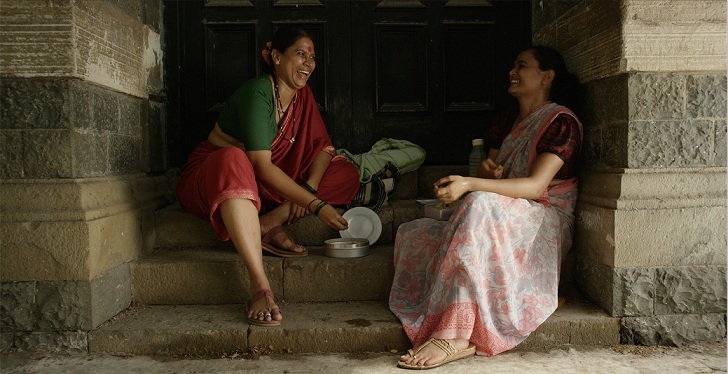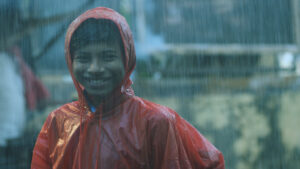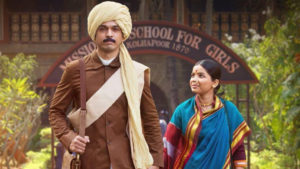
Ravi Jadhav’s Nude begins with a poetic sequence sans dialogues. You see a woman in her poor village home. Before stepping out, she strokes her son who is fast asleep. She is by the side of a water body and all this while she’s been humming a tune. She takes a plunge, swims towards what looks like another shore. As if borne out of a surreal world, we see a woman on a swing. Clad in a flaming red robe, there is gold jewellery all over her. Adding to the mystique, a man emerges from the water and they make passionate love. Exactly the way how we would imagine literature coming into life, the sequence is complete with picturesque locales, breathtaking colours, slow-motion camera and a voyeur (the reader, in case of a literary piece) very much in place.
Nude soon sheds this poetic tone and comes straight onto the premise. We find out that the woman was Yamuna (Kalyanee Mulay) and the man in question was her straying husband. She faces severe rejections in the subsequent portions. The distressed Yamuna is left with no option other than eloping to her aunt’s place in Mumbai with her son, Lahanya. Now, this is the immediate plot and from here till a particular point in the narrative, Nude offers very few surprises.
Written by Jadhav and Sachin Kundalkar, Nude is filled with imageries. One of the initial moments has to be the way Yamuna cleanses herself upon being publicly humiliated by her husband. It takes a while for us to erase the entire whorehouse episode from our memory, especially with the way the prostitute laughs at Yamuna. Soon we see her struggle for work in the busy streets of Bombay. Be it her worn out slippers or her never-ending intrigue for Chandrakka’s (Chhaya Kadam) job, Yamuna’s plights take no time in exploding in front of us. Looking at the way her fiery aunt functions, Nude invokes curiosity on how the film would have been through her eyes.
The first hour of the film is engaging but is also a wee bit taxing since, as viewers, we know where exactly the film is heading. Nude gets better once Yamuna’s profession as a nude model in an art school gets established. There are several heart-wrenching moments, like the one where Yamuna is forced to send her son off to Aurangabad so that he doesn’t create a possible occupational hazard for her family. You seem to think from both sides but the writing is designed so that our sympathies are constantly with Yamuna.
The screenplay assumes fresher hues in the latter half with Lahanya’s refusal to converse with his mother and Yamuna’s discovery that hers is an important profession. In one of the film’s clap worthy moments, she declares, “Education should continue. Be it for my son or for the students out here,” She reacts to a mob protest and walks up the stairs with an incomplete nude painting of hers. Even though the scene is slightly designed to elicit a reaction, it works to great effect. Same goes for the most poignant moment from the film where a new girl wanting to be a nude model seeks her advice. Kalyanee’s speech and body language merge wonderfully with the dim-lit, moody ambience that it leaves no option but to tear up.
There’s also a lot to appreciate in Amalendu Chaudhary’s cinematography. While the tone is delectably uniform, the occasional burst of colours is also worth taking a shine to. Especially with the way the paintings are presented and also how he incorporates shadows and silhouettes intermittently, Chaudhary’s work is top-notch. Also noticeable are the innovative angles and his ability to bring the great drama from close-up shots. My favourite portion in these respects is the pre-climactic jolt by the seaside amidst the rain. While it didn’t appeal to me very much from the writing point of view, the cinematography and transitions do the needful in bringing the emotions alive.
Talking about the way Nude is written, it is a little saddening how Nude resorts to conveniences as opposed to milking this golden opportunity. The boldness in the screenplay feels manipulative as the poverty stretches get repetitive. Yes, it could be a fine recipe for awards but there exists a taste of what it could have been rather. Even the brief bit around protests and freedom of expressions leaves a lot to be desired. The impact gets a bigger blow with the way Nude chooses to end. We do get the commentary on the society’s regression that the film wants to convey but with the way Lahanya’s character is penned, the film leaves us puzzled. Ingrained patriarchy notwithstanding, can a natural born artist be that insensitive to the idea of art? Even otherwise, Lahanya’s patchy characterization seizes the film from a great deal of magic. Another character who gets a rough deal is the young artist who develops a friendship with Yamuna. Nude makes us wish for depth in his character and also in their tender bond. Despite that, the one-off scene where she poses for a celebrated artist (Naseeruddin Shah) is fantastic. Those are exactly the kind of the moments that the film should have been abundant with – where elements of freedom, liberation, innocence and necessity converging in a uniquely symbiotic fashion through two unalike individuals.
As the show concluded, I couldn’t stop applauding Kalyani and Chhaya Kadam for their powerful performances. The original score was resounding and formed a terrific accessory to complement Yamuna’s transitioning states of mind, and also those of the artists for whom she is an object of study. I also ended up comparing the essence of the first sequence to the story in its entirety. For the rest, Nude is rather well-balanced and keeps us hooked until it the end but the film also gives an aftertaste of how it could have been a lot more.
Rating: ★★★

